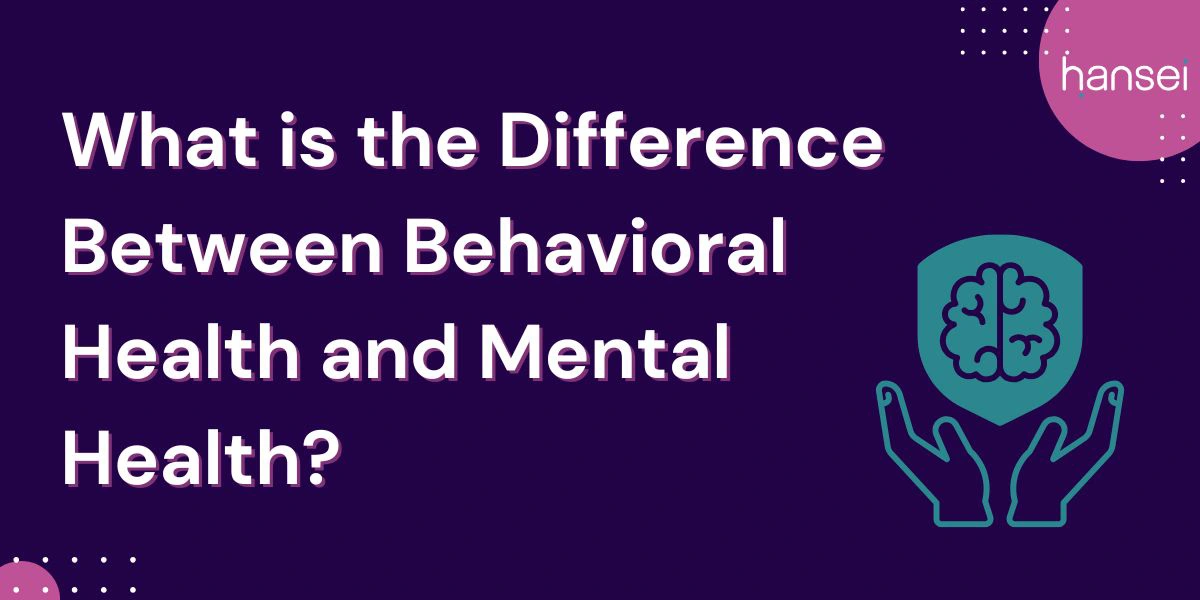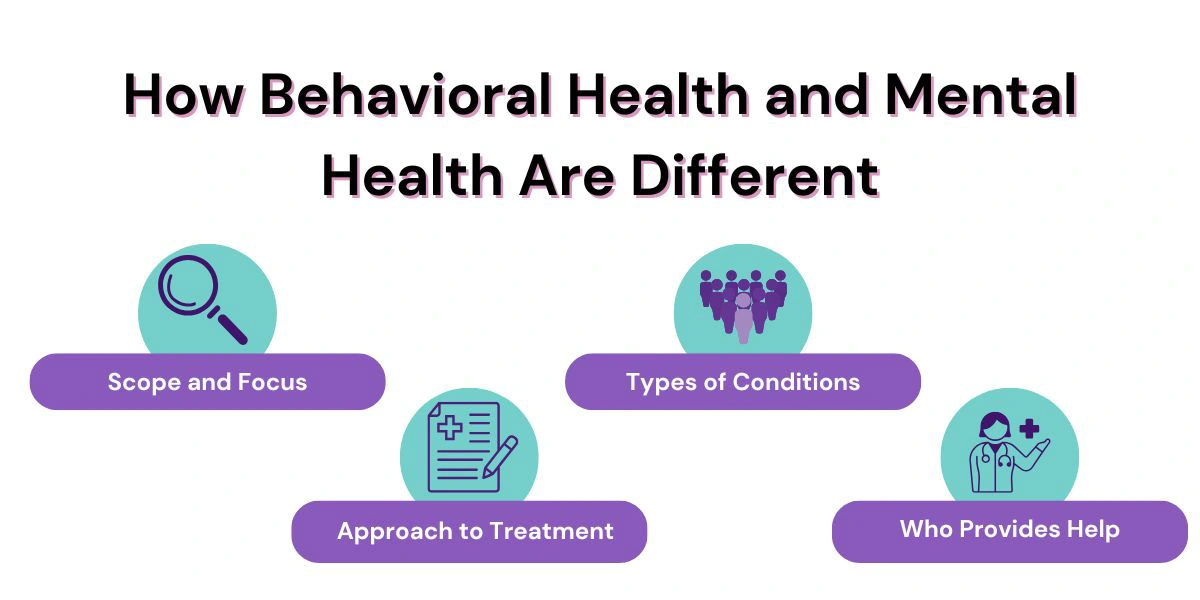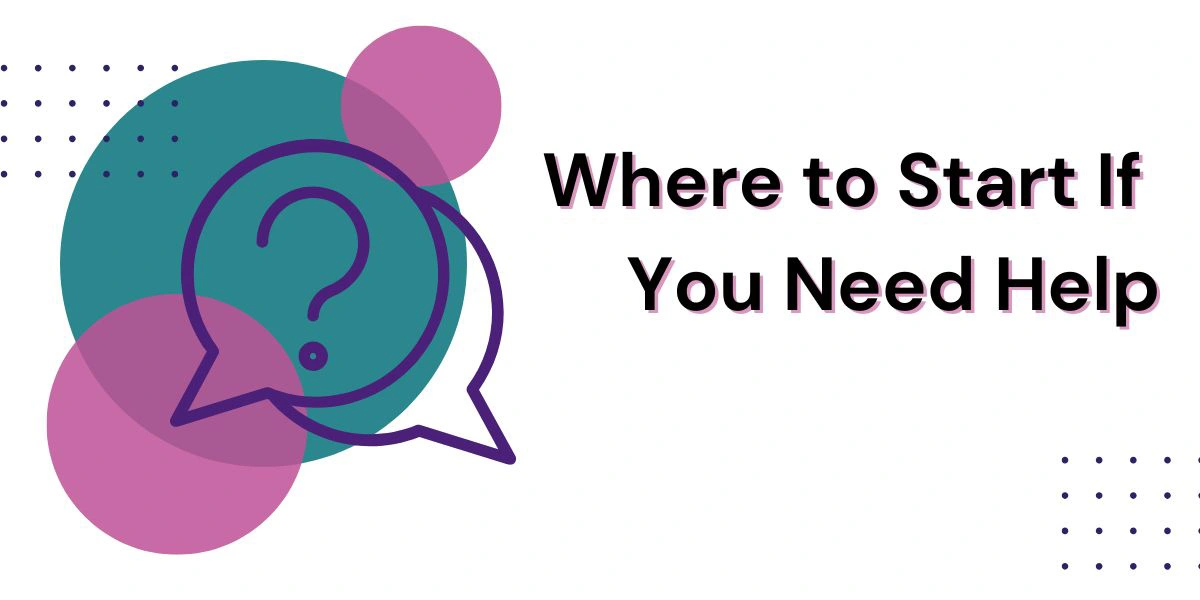Blog

These days, the terms behavioral health and mental health are everywhere. People often use them interchangeably, but they actually mean different things. Knowing the difference can help you better understand what kind of help you might need or how to support someone else.
What is Behavioral Health?
Behavioral health is all about how your habits and actions affect your overall well-being—both physically and mentally. It looks at how behaviors like diet, exercise, sleep, and substance use impact your health. It also includes how you manage stress, relationships, and other aspects of daily life.
- Substance Use: Alcohol and drug use don’t just affect your body; they can also impact your mental state and overall health.
- Eating Habits: How and what you eat can influence your mood, energy levels, and even your risk for mental health disorders.
- Chronic Stress and Anger: If not managed well, stress and anger can lead to physical health problems like high blood pressure, as well as mental health issues like anxiety and depression.
Behavioral health focuses on the cause-and-effect relationship between your actions and your overall well-being. It’s about recognizing unhealthy patterns and learning to change them to improve your health.
What is Mental Health?
Mental health, on the other hand, is about how you think, feel, and behave. It includes your emotional and psychological well-being and affects how you handle stress, relate to others, and make decisions. Mental health conditions are often related to chemical imbalances, genetic factors, or traumatic life events.
Common mental health issues include:
- Anxiety Disorders: Excessive worry, fear, or nervousness that interferes with daily life. According to the Anxiety and Depression Association of America, anxiety disorders affect over 40 million adults in the U.S. every year.
- Depression: Persistent sadness or loss of interest in activities. The World Health Organization reports that depression is the leading cause of disability worldwide.
- Bipolar Disorder: Extreme mood swings that include emotional highs (mania) and lows (depression).
- Schizophrenia: A serious disorder affecting thought processes, emotions, and behavior.
Mental health is about the state of your mind rather than the behaviors that contribute to that state. It often requires professional intervention, including therapy, medication, or a combination of both.

How Behavioral Health and Mental Health Are Different
Although closely connected, behavioral health and mental health focus on different things.
1. Scope and Focus
Behavioral health is broader and looks at how behaviors like substance use, diet, exercise, and sleep patterns impact overall health. Mental health is more specific, focusing on emotional and psychological well-being.
2. Approach to Treatment
Behavioral health treatments often involve changing habits or lifestyle choices through counseling and educational programs. Mental health treatments typically include psychotherapy (like cognitive-behavioral therapy) and medication to manage symptoms.
3. Types of Conditions
Behavioral health covers issues like addiction, stress management, and eating disorders. Mental health involves conditions like depression, anxiety, bipolar disorder, and schizophrenia.
4. Who Provides Help
Behavioral health professionals include counselors, behavioral therapists, and addiction specialists. Mental health care is typically provided by psychologists, psychiatrists, and clinical social workers.
How Behavioral Health and Mental Health Overlap
Despite their differences, behavioral health and mental health are deeply interconnected. For example, chronic stress (a behavioral issue) can lead to anxiety or depression (mental health problems). Alternatively, someone struggling with depression may turn to substance use as a coping mechanism, leading to behavioral health issues.
According to the National Institute on Drug Abuse, about half of people with a mental health disorder will also experience a substance use disorder at some point in their lives. This connection is why integrated treatment is often the most effective. For instance, someone dealing with both addiction and depression might benefit from a treatment plan that includes both behavioral therapy and psychiatric care.
Why It’s Important to Know the Difference
Understanding the difference between behavioral health and mental health matters for several reasons:
- Getting the Right Help: Knowing the distinction helps in choosing the right kind of support. For example, someone struggling with substance use might start with a behavioral health specialist, while someone with anxiety might benefit from seeing a psychologist.
- Better Treatment Plans: Accurate diagnosis leads to more effective treatment. If the underlying issue is behavioral, changing habits may be enough. But if it’s a mental health disorder, medication and therapy may be necessary.
- Reducing Stigma: Clear definitions help in educating people about mental and behavioral health issues, making it easier for individuals to seek help without feeling ashamed.

Where to Start If You Need Help
If you’re dealing with behavioral or mental health issues, the first step is reaching out for help. Here’s where to start:
Behavioral Health Concerns: Consider seeing a behavioral health counselor, therapist, or addiction specialist.
Mental Health Issues: Psychologists and psychiatrists can diagnose and treat mental health disorders. They can also prescribe medication if needed.
Many healthcare providers offer integrated services to address both behavioral and mental health needs. At Hansei Solutions, we believe in a holistic approach, addressing both behavioral patterns and mental health symptoms to ensure comprehensive care.
Taking a Holistic Approach to Behavioral and Mental Health
Understanding the differences between behavioral health and mental health empowers us to make informed decisions about our well-being. Whether you’re seeking help for yourself or supporting someone else, recognizing these distinctions is the first step to effective care.
If you or someone you know needs support, don’t hesitate to reach out to a professional for support. At Hansei Solutions, we’re dedicated to helping behavioral and mental health practices navigate the red tape of billing and compliance. We know that taking the first step is often the hardest, but it can lead to a healthier, more balanced life.

Ready to focus on providing healthcare? Let us lighten your load.
We’re here to address your pain points and create growth opportunities for your organization. We’re passionate about what we do, and it shows in every interaction. Learn what makes us tick and schedule a demo today.